 |
 |
 |
 |
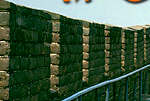 |
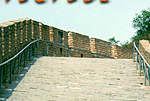 |
 |
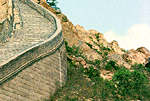 |
 |
 |
 |
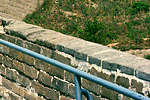 |
 |
 |
 |
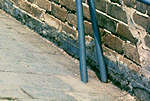 |
|
November 5, 2001 Standing
Aloof?
|
|
Bush wants fast track ability and increased domestic energy resources. According to an article in the New York Times, Bush's plan addresses the need for increased economic globalism to combat terror-inspired fear, and he wants an independent energy source in case Saudi Arabia leaves the US fold and none of the Central Asian states enter the fold. We are supposedly entering a new recession with growth limited to a paltry 1.4%, if that… No biggie. The US is still the world's powerhouse in most fields. A little recession won't keep us from eating steak and potatoes whenever we want to. While We Grow Fat, the Chinese Grow RichThe ridiculous growth rates of the Chinese economy have been making headlines for a few years now. The opportunities presented by a nation of 1.3 billion with a growing desire for the good life has kept Western businessmen drooling and kowtowing for just as long. The fall of the Twin Towers has done nothing to change this. As most of the world is swept up in wartime politics and economics, China keeps on chugging along, racking up 40+ billion dollars in foreign direct investment as it goes. China is the spot corporations want their production lines to be. Labor here is plentiful, obedient and cheap. There will be little whining about sweatshop conditions here. Farmer/porters count their blessings every time someone from the top of one of Chongqing's many hills buys a TV in the lower neighborhoods. These men of stone and sinew lug TVs up and down the hills all day while puffing on throat-searing homegrown. After that they head to the midnight construction site and hew stone for eight hours with a hammer and chisel. 25 yuan (3 USD) for eight hours work. These fellas are a CEO's dream come true. Couple this with a government extremely serious about keeping order and equally serious about bringing in foreign money and you have a country set to become the world's manufacturing plant. China is busy replacing Japan as the electronics manufacturer of the world, and Nokia knows this, as does Motorola, Fujitsu, GE, Samsung, etc. Nokia has just signed a USD100 million with Beijing Mobile, and Motorola has millions invested in the mobile phone business as well. An article in the China Daily puts it this way: "China has many talented professionals, a number of patented high-tech inventions some of which are near international advanced level, a series of regulations and laws guaranteeing the growth of the high-tech sector, and a growing domestic market for high-tech products. These factors combined provide a sound condition for the growth of the high-tech industry in China." Fortune 500 companies have more than 2000 projects running in China right now and more than 100 research centers have been established by major multinationals such as AT&T and Siemens in cooperation with the Chinese government. "The era of China is arriving,"said Harald Lux, president of the OBI Group of Germany, citing the fact that China is the world's largest market for digital converters and the second-largest market for personal computers in Asia. German companies such as Siemens AG and Formtec Gmbh are taking advantage of the rather good relationship between the two countries and the recent visit by Prime Minister Gerhard Schroeder to conduct brisk and profitable business with leading Chinese telecommunications, pharmaceutical and automotive companies. Chinese consider German cars to be the best built in the world, the BMW is called a "treasure/precious horse." Chinese companies hope to use German engineering to prepare their cars for the coming onslaught of multinationals following WTO membership. Both China and the US are hunting for domestic energy sources. While Bush hopes nuclear power will be a cornerstone of future energy, China looks to exploit vast reserves of minerals, gas, oil and coal that have never been developed in the Western Provinces. The Chinese government recently compiled a list of ten sites that need development, preferably with foreign companies leading the drive. Mining right fees, prospecting fees and ownership limitations have all been eased or downright scrapped in some cases in order to make mining in Qinghai more attractive to foreign companies. China is also deeply involved in coal mining in the Thar desert in Pakistan. The project involves a rail link as well as exploitation of billions of tons of coal. ASEAN countries are hoping to cash in on China's rise and stem their own downslide by creating a China = ASEAN Free Trade Area in the coming months. China is moving into the role of regional powerhouse through economic domination. Neighbors, far from being spooked and defensive, are trying to jump on the wagon and get a piece before its gone. China knows this, and is already wondering aloud in an article in the Chongqing Daily what India is doing "looking for more room in the Indian Ocean," as if China already has dibs on the ocean, or a right to say anything at all. One would expect articles like these in the New York Times. So as the US, UK and Russia haggle over who gets to split up Afghanistan as if Kabul were already taken and Osama had already shot himself in his bunker, China continues to assume a leadership of sorts in East Asia. Whether increased economic power in East Asia translates into increased power in Central Asia remains to be seen. |
Text-only printable version of this article Sascha Matuszak
is a teacher living and working in China. His articles have appeared
in the South China Morning Post, the Minnesota Daily,
and elsewhere. His exclusive Antiwar.com column (usually) appears
Fridays. Archived columns China's
Afghan Agenda New
War May Reveal New Superpower, Part II New
War May Reveal New Superpower A
Chance for a New Friendship? Cheating
as a Way of Life China's
Internet Generation Free
Markets or Supermarkets Sailing
Towards World Significance China's
Youth Revolution |
Please Support Antiwar.comSend contributions to Antiwar.com or
Contribute Via our Secure Server |
|
